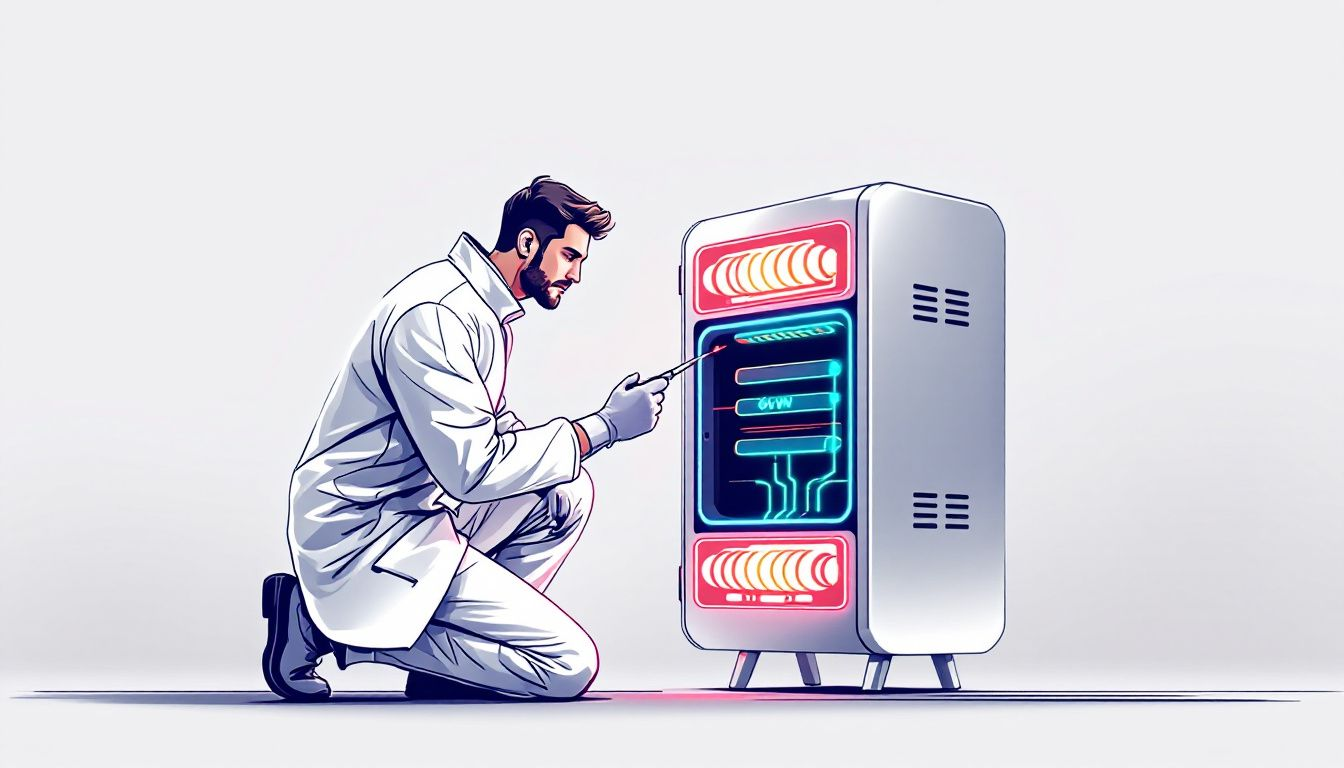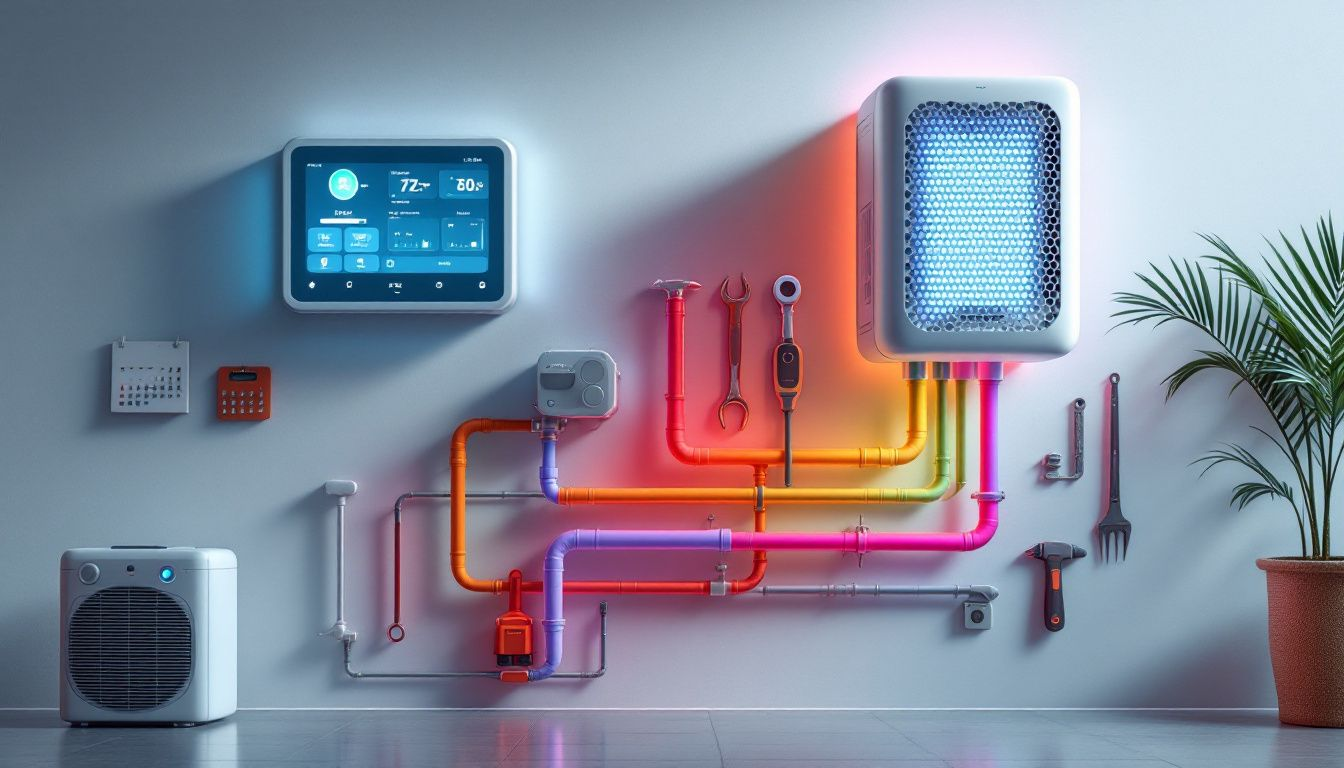Heating Repair
Wondering if your heater needs heating repair? Discover the common signs of heating issues and learn practical tips to troubleshoot and maintain your system to avoid major breakdowns.
Key Takeaways
Recognizing early signs of heater issues, such as unusual noises or uneven temperatures, can prevent costly repairs and maintain comfort.
DIY troubleshooting, like checking the thermostat or changing filters, can often resolve minor heating problems before calling a technician.
Choosing a certified and reputable heating repair service is critical to ensuring quality repairs and efficient HVAC system maintenance.
Quick Links:
Recognizing When Your Heater Needs Repair
Knowing when your heater needs repair can save you from a chilly night and costly breakdowns. One of the first indicators of trouble is unusual sounds emanating from your heater. Clunking, banging, or hissing noises often suggest mechanical issues that need immediate attention. Additionally, if you find yourself constantly adjusting the thermostat to maintain a comfortable temperature, it may indicate uneven heat distribution and underlying system problems.
Another red flag is having to set your heater to unusually high temperatures just to feel warm. This inefficiency may be a sign that your system is overworked and underperforming. Uneven temperatures across different rooms can also point to ductwork issues or other malfunctions within your heating system. Monitoring these symptoms can help prevent further damage and maintain consistent comfort.
High energy bills can be another telltale sign that your heating system is losing efficiency. Older heaters, typically those between 15 to 25 years old, are more prone to breakdowns and inefficiencies. If your system is aging and you notice a yellow pilot light, it’s time to consider an inspection and potential replacement.
Short cycling, where the heater frequently turns on and off, could also signal a malfunction in the heat exchanger.
DIY Troubleshooting Before Calling a Professional
Before rushing to call a professional, there are a few troubleshooting steps you can take to potentially resolve minor issues on your own. If your thermostat won’t turn on, start by checking for loose connections or a blown fuse. Sometimes, the problem could be as simple as a tripped circuit breaker or a recent power outage affecting the thermostat’s functionality. Remember, the thermostat is the brain of your HVAC unit, controlling the temperature and instructing the system when to heat or cool.
Another common issue is a dirty or clogged heater filter. If your filter is not washable, it’s essential to purchase a replacement filter and replace it regularly. A clean filter ensures proper airflow and prevents the system from overheating.
Make sure no objects are blocking vents to maintain optimal performance. These simple steps can often resolve minor malfunctions and keep your system running smoothly.
When to Call a Heating Repair Technician
While DIY troubleshooting can be helpful, certain situations call for professional intervention. A yellow burner flame is a serious concern as it can indicate the presence of carbon monoxide, posing a significant safety risk. Additionally, if you detect burning odors coming from your HVAC unit, this could point to potential electrical issues that require immediate attention from a repair technician.
Nighttime malfunctions of your heater can increase the risk of hypothermia, especially in extreme cold, making it crucial to seek professional help promptly. If you find yourself making frequent repairs, this could indicate a deeper issue with your heating system that needs a thorough evaluation. Unusual sounds like banging or hissing from the HVAC unit are also clear indicators that it’s time to contact a technician.
High electricity costs can be another sign of inefficiencies in your HVAC system, warranting a professional inspection. Consistently warm air from the vents suggests a malfunctioning air conditioning system requiring expert assessment. Water accumulation near the AC unit could indicate a leak or blockage that needs immediate attention. Inconsistent temperatures across different rooms might be due to ductwork issues or improper installation, necessitating professional evaluation of the HVAC problem.
Choosing the Right Heating Repair Service Company
Selecting the right heating repair service company is crucial for ensuring quality repairs and maintenance. Start by checking if the company holds certifications from reputable organizations like the Better Business Bureau (BBB). Technicians at companies like McGee Heating & Air Inc., for example, hold NATE certifications, which are a mark of excellence in the HVAC industry, including hvac repair.
Customer reviews and word-of-mouth recommendations are invaluable. Positive feedback from neighbors and friends can guide you to trusted service providers like Minot Plumbing & Heating, known for their 100% satisfaction guarantee. Hiring the right HVAC service company ensures energy-saving and worry-free comfort, making your investment worthwhile.
When choosing a service company, look for friendly professionals with specialized knowledge. A reputable company will provide technicians who are not only skilled but also courteous and professional, ensuring a positive experience. The right service company can make all the difference in maintaining your heating and cooling systems efficiently, including air conditioning services.
Emergency Heating Repair Services
Emergencies don’t wait for convenient times, and neither should your heating repair services. Emergency heating repair services are available 24/7, ensuring you can get assistance anytime you need it. Quick response times, typically within a few hours, are crucial to minimize discomfort and maintain home comfort.
Addressing urgent heating issues promptly is vital for both comfort and safety. Timely emergency repairs can prevent minor issues from escalating into severe and costly problems. This not only helps in maintaining safe indoor temperatures but also in protecting vulnerable populations within your home.
Having immediate access to emergency heating repair services significantly reduces the risk of health issues during extreme cold. It also helps prevent further property damage related to heating failures. Knowing that help is just a phone call away brings peace of mind during the harsh winter months.
Maintaining Your HVAC System for Longevity
Regular maintenance is the cornerstone of a long-lasting HVAC system. Regular inspections help maintain your heating system’s functionality and prevent unexpected breakdowns. Seasonal maintenance can prevent nearly 75% of HVAC system failures, ensuring reliable performance year-round.
Clean filters are essential for optimal HVAC performance. Dirty filters can reduce airflow, cause overheating, and lower indoor air quality. Inspect your HVAC filter at least once a month and change or wash it more often if you have pets or live in a high-dust area. Ensure all air conditioner vents are open and unobstructed to allow for optimal airflow and system efficiency.
Outdoor unit maintenance is equally important. Keep the grass mown and remove debris around the outdoor unit to ensure it operates efficiently. Ensure at least two feet of clearance around the indoor unit to prevent blockages and maintain optimal performance. Following these maintenance tips can extend the lifespan of your HVAC system and ensure it runs smoothly.
The Benefits of Energy-Efficient HVAC Systems
Investing in energy-efficient HVAC systems comes with numerous benefits. These systems lead to reduced energy costs due to their lower energy consumption for heating and cooling. Replacing traditional HVAC systems with a new system of high-efficiency models can cut energy consumption by up to 50% for electric systems, contributing to significant savings.
Energy-efficient HVAC units provide more consistent temperature control, enhancing overall comfort. They also tend to operate more quietly compared to traditional units, minimizing disruption in daily activities. With higher Seasonal Energy Efficiency Ratio (SEER) ratings, these systems offer better cooling efficiency and performance, including heat pumps.
Moreover, investing in energy-efficient HVAC systems can increase your property’s value, making your home more appealing to potential buyers. Most homeowners also find that these systems contribute to a reduced carbon footprint by lessening overall energy use, making them an environmentally friendly choice.
Indoor Air Quality Solutions
Indoor air quality is vital for a healthy living environment. A malfunctioning heating system can circulate dust and allergens, decreasing air quality in your home. Routine maintenance is essential for improving indoor air quality by reducing allergens and pollutants.
Filtration methods, such as air purifiers and upgraded HVAC filters, can serve as effective complements to ventilation and source control. Portable air purifiers are intended to filter the air in individual rooms, while HVAC filters work to purify air throughout the entire home. However, while air purifiers and HVAC filters help reduce indoor air pollution, they cannot eliminate all contaminants from the air.
Ventilators designed for homes ensure a steady influx of fresh outdoor air, helping to eliminate indoor pollutants and improve air quality. Advanced air purifiers can capture particles as small as 0.3 microns, effectively removing allergens and harmful pollutants from the air. These iaq solutions can significantly enhance the air quality in your home, contributing to better health and comfort.
Summary
Recognizing the signs that your heater needs repair and knowing when to call a professional can save you from discomfort and costly repairs. Regular maintenance and timely troubleshooting are essential for the longevity and efficiency of your HVAC system.
Investing in energy-efficient HVAC systems and implementing indoor air quality solutions can significantly enhance your home comfort. By following the tips outlined in this post, you can ensure that your heating system remains reliable and efficient, keeping your home warm and comfortable throughout the winter months.
Frequently Asked Questions
What are the signs my heater needs repair?
If you're noticing unusual sounds, frequent thermostat adjustments, or a spike in your energy bills, it's likely time to consider a heater repair. Addressing these signs promptly can help maintain your system's efficiency.
How often should I replace HVAC filters?
You should inspect your HVAC filter at least once a month and replace or wash it as needed, particularly if you have pets or live in a dusty environment. Regular maintenance ensures efficient system performance and improved air quality.
When should I call a heating repair technician?
You should call a heating repair technician if you observe a yellow burner flame, detect burning odors, or experience frequent malfunctions. Addressing these issues promptly can prevent further complications.
What should I look for in a heating repair service company?
When choosing a heating repair service company, prioritize certifications, positive customer reviews, and satisfaction guarantees to ensure quality and reliability.
What are the benefits of energy-efficient HVAC systems?
Energy-efficient HVAC systems offer significant reductions in energy costs while ensuring consistent temperature control and quieter operation, ultimately contributing to a lower carbon footprint.





